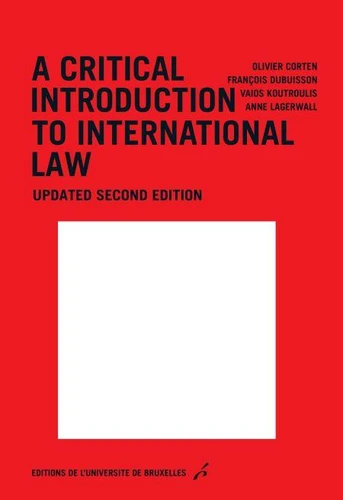- Accueil /
- Olivier Corten
Olivier Corten

Dernière sortie
A critical introduction to international law
Is international law universal? Can it be anything else than the will of the actors who are able to impose on others their values and interests? Beyond the strategic objectives that can be pursued - by a lawyer pleading before a court, a state representative operating in an international organization or addressing the general public, an author seeking recognition, or a citizen interested in the law - since international law cannot be interpreted objectively, can it at least be interpreted in a convincing and well-argued way? These are the questions that underlie this book, which, following a critical approach, emphasizes the profound ambivalence of international law.
International law appears to be torn between, in the one hand, the pursuit of a universalist ideal of justice and peace, and, on the other, the need to deal with power relations in a political context. From this perspective, it would be futile to claim to establish - and even less to discover - one single 'correct' interpretation of legal rules such as, for example, the right to self-determination, the principle of non-intervention or the prohibition of genocide.
It is however possible to provide an overview of the main debates among states, other international actors or among legal scholars relating to the interpretation of the main rules of international law. In the book, these debates are illustrated by references to popular culture, in particular, music and films. The ambition of this book is to enable the reader, on the basis of these elements, firstly to position himself or herself by selecting and defending the arguments that seem most convincing and secondly, and more fundamentally, to understand the legal and political terms of the controversies in international law.
This revised second edition includes updates in case law and practice, from the war in Ukraine to the war in Gaza, as well as legal developments related to climate change.
International law appears to be torn between, in the one hand, the pursuit of a universalist ideal of justice and peace, and, on the other, the need to deal with power relations in a political context. From this perspective, it would be futile to claim to establish - and even less to discover - one single 'correct' interpretation of legal rules such as, for example, the right to self-determination, the principle of non-intervention or the prohibition of genocide.
It is however possible to provide an overview of the main debates among states, other international actors or among legal scholars relating to the interpretation of the main rules of international law. In the book, these debates are illustrated by references to popular culture, in particular, music and films. The ambition of this book is to enable the reader, on the basis of these elements, firstly to position himself or herself by selecting and defending the arguments that seem most convincing and secondly, and more fundamentally, to understand the legal and political terms of the controversies in international law.
This revised second edition includes updates in case law and practice, from the war in Ukraine to the war in Gaza, as well as legal developments related to climate change.
Is international law universal? Can it be anything else than the will of the actors who are able to impose on others their values and interests? Beyond the strategic objectives that can be pursued - by a lawyer pleading before a court, a state representative operating in an international organization or addressing the general public, an author seeking recognition, or a citizen interested in the law - since international law cannot be interpreted objectively, can it at least be interpreted in a convincing and well-argued way? These are the questions that underlie this book, which, following a critical approach, emphasizes the profound ambivalence of international law.
International law appears to be torn between, in the one hand, the pursuit of a universalist ideal of justice and peace, and, on the other, the need to deal with power relations in a political context. From this perspective, it would be futile to claim to establish - and even less to discover - one single 'correct' interpretation of legal rules such as, for example, the right to self-determination, the principle of non-intervention or the prohibition of genocide.
It is however possible to provide an overview of the main debates among states, other international actors or among legal scholars relating to the interpretation of the main rules of international law. In the book, these debates are illustrated by references to popular culture, in particular, music and films. The ambition of this book is to enable the reader, on the basis of these elements, firstly to position himself or herself by selecting and defending the arguments that seem most convincing and secondly, and more fundamentally, to understand the legal and political terms of the controversies in international law.
This revised second edition includes updates in case law and practice, from the war in Ukraine to the war in Gaza, as well as legal developments related to climate change.
International law appears to be torn between, in the one hand, the pursuit of a universalist ideal of justice and peace, and, on the other, the need to deal with power relations in a political context. From this perspective, it would be futile to claim to establish - and even less to discover - one single 'correct' interpretation of legal rules such as, for example, the right to self-determination, the principle of non-intervention or the prohibition of genocide.
It is however possible to provide an overview of the main debates among states, other international actors or among legal scholars relating to the interpretation of the main rules of international law. In the book, these debates are illustrated by references to popular culture, in particular, music and films. The ambition of this book is to enable the reader, on the basis of these elements, firstly to position himself or herself by selecting and defending the arguments that seem most convincing and secondly, and more fundamentally, to understand the legal and political terms of the controversies in international law.
This revised second edition includes updates in case law and practice, from the war in Ukraine to the war in Gaza, as well as legal developments related to climate change.
Les livres de Olivier Corten

Une histoire du droit international. De Salamanque à Guantanamo
Gerard Bedoret, Olivier Corten, Pierre Klein
Album
27,00 €

76,00 €

1,00 €

A critical introduction to international law
Olivier Corten, François Dubuisson, Valos Koutroulis, Anne Lagerwall
E-book
26,99 €

Une histoire du droit international. De Salamanque à Guantanamo
Gerard Bedoret, Olivier Corten, Pierre Klein
E-book
18,99 €

A critical introduction to international law
Olivier Corten, François Dubuisson, Vaios Koutroulis, Anne Lagerwall
E-book
17,99 €

124,99 €

149,99 €

A critical introduction to international law
Olivier Corten, François Dubuisson, Valos Koutroulis, Anne Lagerwall
Grand Format
27,00 €

Une introduction critique au droit international
2e édition actualisée
Olivier Corten, François Dubuisson, Valos Koutroulis, Anne Lagerwall
Grand Format
27,00 €

13,00 €

39,00 €

La vérité en procès. Les juges et la vérité politique
Julie Allard, Olivier Corten, Martyna Falkowska, Vincent Lefebve
Grand Format
39,00 €

Le droit comme idéologie. Introduction critique au droit belge
2e édition
Olivier Corten, Annemie Schaus
26,00 €

The Use of Force in International Law. A Case-Based Approach
Tom Ruys, Olivier Corten, Alexandra Hofer
Grand Format
64,20 €

"A la paix comme à la guerre ?". Le droit international face aux exécutions extrajudiciables ciblées
Olivier Corten
Grand Format
18,00 €

Du droit international au cinéma. Présentations et représentations du droit international dans les films et les séries télévisées
Olivier Corten, François Dubuisson
30,00 €

158,00 €

151,00 €
